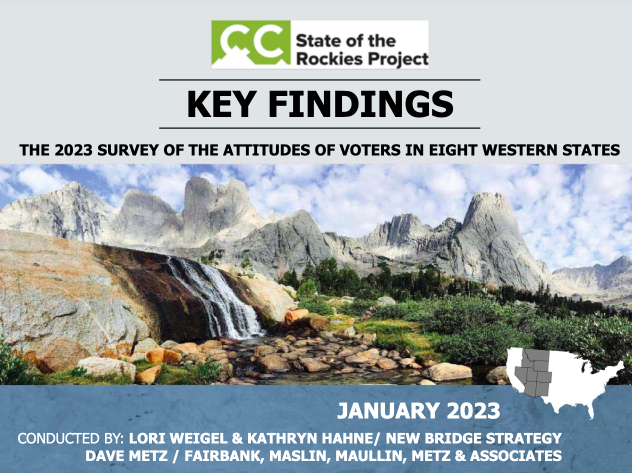Resources
Search below for resources covering the intersection of climate engagement, social science and data analytics.
RESULTS
Poll: Rural voters may be swingable
While partisanship remains strong among the rural electorate, more than one-third (37%) of rural voters appear "swingable" in future elections, depending on resonant policy proposals and messaging. Three messaging points — lowering prices; bringing good-paying jobs to local communities; and a populist message focused on corporate greed — received such broad support that they rivaled voters’ agreement on core values like family and freedom. Read additional analysis in the Daily Yonder's coverage.
Poll: Majority approve of Lombardo’s early job performance
Nevada voters are deeply concerned about water issues, and few believe that the state is doing enough to address climate change. 46% of Nevada voters say that the state isn’t doing enough to address climate change, compared to just 11% who say that the state is doing too much and 25% who say that the state is doing the right amount. Just over half of Nevadans say they approve of Gov. Joe Lombardo’s job performance four months into his term. Of those respondents, however, only 16 percent said they “strongly approve” of Lombardo’s performance, while another 35 percent said they “somewhat approve.” Another 21 percent of respondents said they have “no opinion.” Lombardo’s approval also differed widely among genders — it was as high as 61 percent among men, compared with just 42 percent among women — as well as by region. Lombardo’s highest marks came from the state’s rural counties (70 percent approval).
Environmental Polling Roundup - February 24th, 2023
This post includes climate and environment headlines, data points, and key takeaways from recent public polls - including new polling on conservation, climate, and energy issues in Western states + new national polling on the Inflation Reduction Act + state-level polling in Minnesota about the state’s new clean energy bill and other environmental priorities.
2023 Conservation in the West Poll
Residents of US western states continue to prioritize conservation of the land, water, wildlife, and their ability to enjoy the outdoors. People in New Mexico, Arizona, Colorado, Utah, Nevada, Montana, Wyoming, and Idaho were surveyed for this poll. 97% of westerners believe the rising cost of living is a serious issue, and 89% believe the price of gasoline is a serious issue. There has been a 28-point increase since 2016 in the share of westerners who say that people moving to their state is a serious problem (from 47% to 75%). 50% of westerns say that the current shortage of water in the west is a serious crisis. The plurality of westerners (38%) say that businesses use the most water in their state, as compared to farmers and ranchers (34%) and households (25%).
Environmental Polling Roundup - May 20th, 2022
This post includes climate and environment headlines, data points, and key takeaways from recent public polls - including a new report from Pew on Americans’ attitudes toward different energy sources, new battleground polling on a potential reconciliation package in Congress, and new polling about carbon removal.
Poll: May ’22 Poll On Reconciliation Legislation
Legislation along the lines of the Build Back Better Act is overwhelmingly popular in key U.S. Senate battlegrounds, with clear electoral benefits for incumbents if it passes. On the specific question of how support for this legislation would translate to electoral benefits for incumbents who back it, the poll finds that voters in the four battlegrounds (Nevada, Georgia, New Hampshire, and Arizona) are 23 to 33 points more likely to say that the legislation would make them more inclined to vote for their incumbent than less inclined. 14% of those who do not currently approve of the incumbent say they would be more likely to vote for them if they help pass this legislation. Across the four states, 62% say they would be more motivated and enthusiastic about voting in the elections this November if Congress took action and actually passed this legislation. Democrats in particular would be more motivated to vote (81%), including many Democrats who currently express a lower degree of enthusiasm about voting.
Poll: Climate change, increase in wildfires worry a majority of Nevadans
A majority of Nevadans are concerned about the impact of global warming, especially when it comes to the rise in wildfires in the West and resulting poor air quality.
- That sentiment is strongest in Washoe County, where the past two summers have been smoke-filled due to catastrophic wildfires in California. Almost all Washoe County residents polled have concerns about wildfires and resulting air pollution.
- More than half of those polled in Clark County and nearly two-thirds of those in Washoe County said climate change impacts them daily, including 69% of Black respondents.
- 78% of those aged 18-24 agreed climate change is impacting their lives, while less than half of those aged 65-74 agreed.
- The lone segment of Nevadans who did not report seeing a daily impact due to climate change was rural Nevada, where more than three-quarters said global warming doesn’t impact them.
- Nevadans on both sides of major political party lines are united by concern about the recent rise in the size, frequency and severity of wildfires — 95% of Democrats and 72% of Republicans agreed it’s a problem.
- While wildfire concerns span party lines, concerns about air quality do not — 90% of Democrats are concerned, as opposed to only 48% of Republicans.
Poll: The 12th Annual Survey of Voters in the Rocky Mountain West
Overwhelming majorities of voters in western states support pro-conservation policies. Wildfires and droughts are especially salient concerns throughout the region. The 2022 poll surveyed registered voters in eight western states: Arizona, Colorado, Idaho, Montana, Nevada, New Mexico, Utah, and Wyoming. Majorities now say that inadequate water supplies (70%, up 30 points since 2011), the loss of natural areas (55%, +19 since 2011), the loss of habitat for fish and wildlife (55%, +17 since 2011), pollution of rivers, lakes, and streams (54%, +12 since 2011), and climate change (52%, +25 since 2011) are “extremely” or “very” serious problems in their state. Western voters are most acutely concerned about droughts and reduced snowpack (59% “very” concerned) and more frequent and severe wildfires (52% “very” concerned). Nearly three-quarters of western voters (74%) say that drought is an “extremely” or “very” serious problem in their state, an increase of 22 points since 2016. For wildfires, 91% say that “uncontrollable wildfires that threaten homes and property” are a serious problem in their state - an increase of 14 points since 2016.
Environmental Polling Roundup - February 18th, 2022
This post includes climate and environment headlines, data points, and key takeaways from recent public polls - including new national polling on pollution in the manufacturing sector, investments in clean energy jobs and development, plastic pollution, and climate as a legislative priority + a major new report on environmental attitudes in western states.
Environmental Polling Roundup - November 5th, 2021
This post includes a roundup of climate + environment headlines, data points, and key takeaways from this week’s public polls - including fresh polling on the new Build Back Better framework and its core climate and energy provisions + analysis of climate polling trends throughout the year + new polling on attitudes about climate and clean energy among Latino voters in battleground states and districts.
Pagination
- Page 1
- Next page



